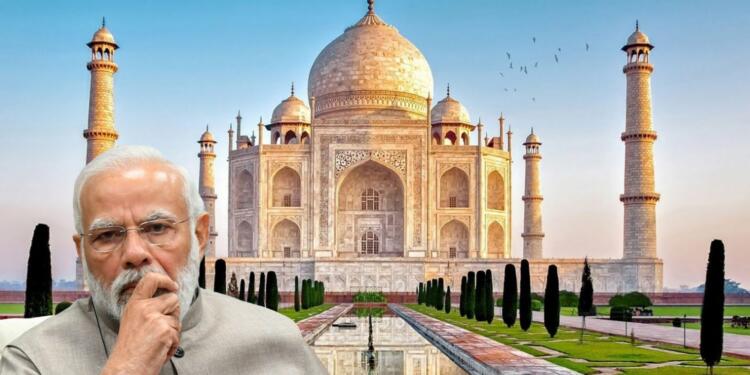Prime Minister Narendra Modi is poised to launch the inaugural ceremony of the Agra Metro’s ‘priority corridor,’ a significant milestone in India’s urban transport infrastructure. Scheduled for tomorrow, the event will witness PM Modi and Uttar Pradesh Chief Minister Yogi Adityanath commemorating the occasion via video conference from Agra. This corridor, overseen by the Uttar Pradesh Metro Rail Corporation (UPMRC), heralds a new era in facilitating seamless access for tourists to Agra’s iconic landmarks such as the Taj Mahal and Agra Fort.
The Priority Corridor
The ‘priority corridor,’ spanning 6 kilometers, has been completed with unprecedented speed, a testament to efficient project management under the UPMRC. The commencement of metro train operations along this corridor marks a pivotal moment in Agra’s transportation landscape, promising enhanced connectivity and convenience for both locals and tourists alike.
Agra, steeped in history and cultural heritage, boasts several UNESCO World Heritage sites, including the illustrious Taj Mahal, Agra Fort, Sikandra Tomb, and more. With the introduction of the Agra Metro, these historic marvels will now be effortlessly accessible via a modern and efficient mode of transportation, catering to the burgeoning influx of visitors to the city.
Agra Metro Rail
The Agra Metro Rail Project, conceived to address the city’s growing transportation needs, has been a collaborative effort between the state and central governments, along with support from international partners such as the European Investment Bank (EIB). With an estimated total expenditure of Rs. 8379.62 crore, the project underscores a commitment to bolstering Agra’s infrastructure while promoting sustainable and eco-friendly practices.
Six Stations
The ‘priority corridor’ comprises six stations, strategically located to optimize connectivity and accessibility. The initial three stations – Taj East Gate, Shaheed Captain Shubham Gupta, and Fatehabad Road Station – are elevated, providing a bird’s eye view of the city’s bustling landscape. The remaining stations, namely Taj Mahal, Agra Fort, and Mankameshwar, are situated underground, ensuring seamless integration with the city’s existing infrastructure.
In a remarkable feat of engineering prowess, the construction of the Agra Metro has set new benchmarks for speed and efficiency. The underground stretch, spanning 3 kilometers and including intricate tunnel networks, was completed within an astonishing 11-month timeframe, making it the fastest underground metro project in India. Similarly, the elevated corridor, covering 29 months of construction, reflects a concerted effort to expedite project delivery without compromising on quality or safety standards.
Also Read: How Indian Forces are evolving from “Ghulami Ki Maansikta”?
Environmental Sustainability at the Forefront
An essential aspect of the Agra Metro’s development has been its commitment to environmental sustainability. From the outset, the UPMRC has prioritized green and eco-friendly practices, earning accolades for its efforts in environmental and safety management. The project has received ISO 14001 certification for environmental management and ISO 45001 certification for safety management, underscoring its adherence to international standards.
Furthermore, the Agra Metro’s infrastructure has been designed with sustainability in mind, incorporating features such as tree plantation and afforestation efforts along the metro corridor. Rather than resorting to tree felling, UPMRC opted to relocate trees, ensuring minimal ecological disruption. Additionally, extensive tree plantation initiatives spanning a 21-hectare area have been undertaken as part of mandatory afforestation efforts, further enhancing the project’s environmental credentials.
Notably, two metro stations – Captain Shubham Gupta and Fatehabad Road – have been awarded the prestigious Platinum rating from the Indian Green Building Council, recognizing their exemplary commitment to sustainable building practices. These accolades underscore the Agra Metro’s status as a pioneering project in India’s quest for sustainable urban development.
Supporting ‘Make in India’ and ‘Atmanirbhar Bharat’ Initiatives
In alignment with the government’s ‘Make in India’ and ‘Atmanirbhar Bharat’ initiatives, the Agra Metro project incorporates provisions for indigenous manufacturing, reflecting a broader commitment to promoting self-reliance and indigenous innovation. With 28 metro trains equipped with three coaches each, the Agra Metro is poised to revolutionize urban transport in the city, offering a reliable, efficient, and environmentally sustainable mode of commuting.
As Agra gears up to welcome the inauguration of its much-awaited metro corridor, the event symbolizes not just a milestone in transportation infrastructure but also a testament to India’s commitment to sustainable development and inclusive growth. With the promise of enhanced connectivity, accessibility, and environmental stewardship, the Agra Metro heralds a new dawn for the historic city, setting the stage for a brighter and more sustainable future.
Also Read: The Reign Of Salma The Cruelty Concealed in Female Trafficking Rings
























